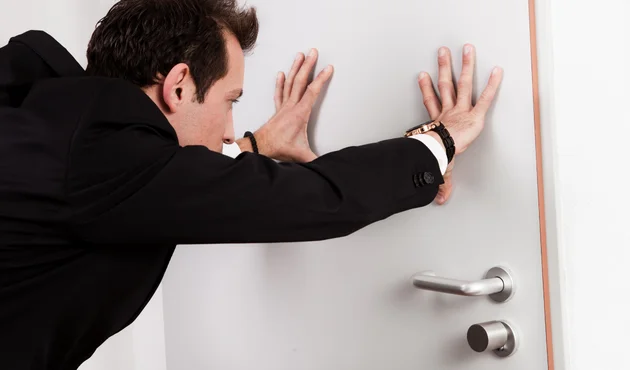
The Most Common Door-To-Door Sale Scams You Need To Watch Out For
What do you do when you are not expecting anyone and suddenly someone knocks on your door? You probably open it anyway. Think about whether you should, because increasingly fraudsters are targeting homeowners by going door-to-door!
They may claim to be from the government or a utility company, and say that they need to come inside your home to check something or make a repair. Or, they may try to sell you a product or service that you don't need.
There are a few different types of door to door scams, but they all have one thing in common: the goal is to get money from you illegally.
The most common door-to-door sales scams techniques

If you're not expecting a door-to-door salesperson, be wary. It could be a scammer. Here are the most common scams to watch out for:
The first is the energy audit scam. The salesperson will say they're from the utility company and offer a free energy audit. They'll try to get into your home to check your appliances and may even tamper with them to make it appear as though you're using more energy than you actually are. They'll then tell you that you need to buy new, energy-efficient appliances and have their company install them.
The second is the fake charity collections. The salesperson will say they're collecting donations for a worthy cause, such as cancer research or the disabled. They may even show you a fake ID to make it seem legitimate. But once they have your donation, they keep the money for themselves.
The third is the home improvement scam. The salesperson will say your home needs repairs, such as a new roof or windows. They'll give you an estimate that's much higher than what it would actually cost to do the work. And even if you agree to have the work done, they'll do a shoddy job or simply take your money and run.
Another example of doorstep scam is when someone comes to your door and says they're selling something. They may try to pressure you into buying it by saying it's a limited time offer or there's only a few left. They can sell absolutely anything. Their offers are very attractive and often considerably cheaper than in shops. These can be not only physical products, but also various types of services, passes, vouchers. Don't trust any rogue traders.
Finally, there's the prize scam. The salesperson will say you've won a free holiday or some other prize. But in order to collect it, you have to pay a fee or buy something first. Of course, you never actually get the prize. Watch out these bogus salespeople.
There may also be people knocking on your front door who do not want to sell you anything, but are pretending to be poor and in need of help. They may say they're stranded and need money for food or they've been in an accident and need help getting to the hospital.
These are the most difficult situations in which it is hardest for us to judge whether these people really do not need our help. It is often then that emotions come into play. Usually people are willing to help. Remember, however, that many fraudsters operate in this way. They unscrupulously take advantage of people's feelings and goodwill.
To make matters worse, fraudsters also impersonate government officials, which is very difficult to catch. No one expects a scam here, and yet.... It may be unrealistic, but always check every person you let into your home, as it may turn out to be one of the bogus officials.
What should concern you?

A red light should go on in your head when:
-The seller has shown you a valid ID card, but you cannot find any information about him/her and the company on the web;
- Something doesn't suit you about his/her behaviour - perhaps unprofessional behaviour, language errors, lack of proper knowledge of the questions asked;
- There is no possibility to pay with a card and the salesperson asks you to pay in cash only;
- He/she is pushy and puts you under pressure, e.g. by saying that such a good offer is only valid for 5 minutes.
Trust your intuition when dealing with anyone who knocks on your door uninvited.
What you can do to protect yourself from door-to-door scams?
Here are some tips to protect yourself from door-to-door scams:
-If someone comes to your front door unexpectedly, don't let them in. Ask for identification and call the company they claim to represent to verify their story. Unfortunately, very often they provide false identity, and will scatter when you try to identify them.
-Don't sign anything on the spot. Scammers sometimes use high-pressure tactics to get people to sign contracts or agreements right away. If you're interested in what they're selling, tell them you'll need time to think about it and call them back.
-Never give out personal information or bank account information to someone you don't know.
-If you're not interested in what the person is selling, just say "no thank you" and close the door. Don't be rude, but don't feel like you have to be polite either.
What to do if you are a victim of door-to-door scammers?
If you find that you have been scammed, please report it to your local police or Action Fraud by calling 0300 123 2040 in the first instance.
You can also report the salesperson to the Citizens Advice on 0808 223 1133. If you believe they have sold you faulty products or services you can report the fraud to National Trading Standards.
If you have made a payment by credit or debit card you should immediately contact your bank to cancel any transactions.
It's all just not worth it. If your bank or insurance policy covers any damage, you'll still have to cope with a damaged credit rating, numerous communications over an extended time period to repair the collateral damage, and the emotional distress and and anxiety identity theft can cause.
How to close the door on a potential door to door scam?

If you're not expecting someone, keep your doors locked. It's a simple rule that can help protect you from fraud. Unfortunately, doorstep fraud involves fraudsters who target victims at their homes.
If you're ever in doubt, don't open the door. You can always call the police if you think something suspicious is going on. And remember, if it sounds too good to be true, it probably is. Door-to-door salesmen are often not who they say they are, so it's best to be cautious.
Have you ever been the victim of a door-to-door scam? What happened? Share your story in the comments below.